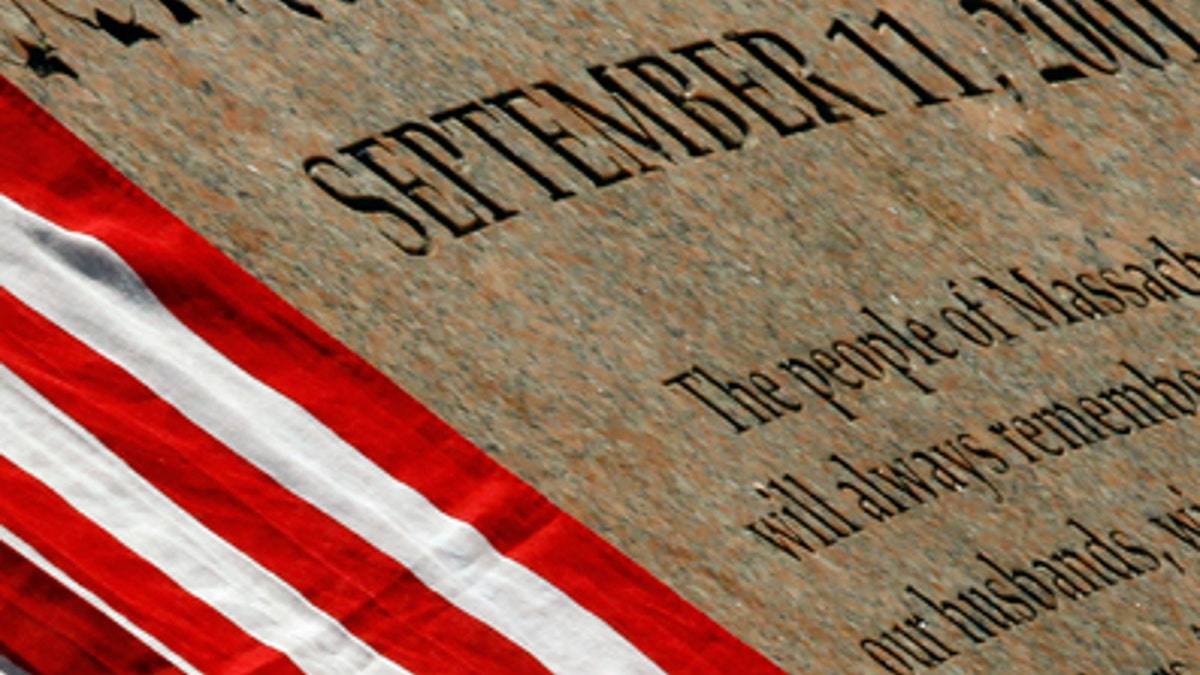
U.S. flag rests on the memorial to Massachusetts victims of the attacks of September 11, 2001 in Boston (Reuters)
The stories of courage and heroism during the terrorist attacks on September 11, 2001 and its aftermath are well-known. First responders risked their lives to save those of others. Families found the internal strength—from somewhere deep inside, from God—to continue loving and nurturing their children after the loss of husbands and wives and fathers and mothers and brothers and sisters. Businesses that collapsed were rebuilt. Communities covered in ash reemerged.
Those who showed us the greatest of the human soul and the American spirit include President Bush, Mayor Rudi Giuliani, Firefighter Bob Beckwith, Howard Lutnick of Cantor Fitzgerald, Flight 93 widow and paragon of grace Lisa Beamer. But the list of those who were inspiring in the face of destruction is simply too long to write.
It has been a decade, and many, many thousands of people have shown remarkable resolve to restart their lives. Ground Zero is itself being reclaimed from catastrophe and rebuilt into towers that will symbolize American resolve and creativity and commitment.
The evidence of iron will and resurrection in our people is so substantial that it could obscure the continuing psychological toll of 9/11 on the individuals and families most deeply traumatized by it.
Without doing any disservice to those who have overcome their suffering, it is worth thinking about those who still struggle, a decade later, to heal. For it is in their journeys that we can see the continuing toll of the 9/11 attacks. It is in their journeys that we see what it costs to have created a culture that glows so brightly that it attracts to it forces of darkness.
Above the entrance to the Boston Veteran’s Administration Hospital, where I worked with men who were still haunted by what they had seen defending our nation, were inscribed these words: “The Price of Freedom Is Visible Here.”
Well, “The Price of Freedom” is, likewise, visible in the lives of those who continue to struggle after their experiences on 9/11.
Among those who survived the collapse of the World Trade Center or toiled amidst its wreckage are some who are still plagued by nightmares or intrusive and grotesque recollections by day, those who live with a sense of unreality—as though not truly alive at all, those who suffer with major depression, those whose marriages never recovered and those who have fallen victim to quelling their pain with alcohol or illicit drugs.
These good and decent people, whose vulnerability is testimony to their humanity, sit with counselors to this day, trying to pull their psyches out from under steel beams of terror.
Among those who survived the collapse of the World Trade Center are sons and
daughters and sisters and brothers for whom catastrophic loss of a parent on 9/11 sparked anxiety disorders that still cause them panic attacks, whose capacity to be intimate in adult relationships will be limited by the fact that they are unsure whether anything in life can truly be relied upon. Once your mother sits you down and tells you, at 4 or 9 or 12, that you will never again see the father you loved so deeply, the shadow of that horror can eclipse a good deal of your journey through life. Once you get a call while you are a thousand miles away telling you that your sister died because a plane commandeered by a fanatic pierced the skyscraper where she worked, that call can resonate through your unconscious mind for decades, waking you from sleep, reducing you to tears in the middle of conversations, stealing your motivation, even making you question whether you want to go on living.
Among those who survived the collapse of the World Trade Center are firefighters and police officers and rescue personnel and ER workers and doctors and airline personnel and government personnel whose identities were grounded in their capacity to keep others safe and keep them alive. And to realize in a crushing instant that enemy combatants can defeat your best intentions can leave you wandering this life looking for meaning.
I would tell all these people only this: The human spirit is miraculous. It manifests its awesome power most completely when denial is defeated and monsters can be seen for what they are. To defeat fear, speak of it. To defeat uncertainty, share it. To defeat depression, delve deeply into the roots of it. To defeat loss, think of the love that is necessary to set the stage for it. To defeat isolation, find a healer to sit with and talk with and share with.
We will be healing from 9/11 for generations. A hundred years from now there will be great, great-grandchildren of survivors who wrestle with the impact of those planes in New York and Washington and Pennsylvania. We do well to turn no blind eye to the price of freedom, but that cost has never, and will never, compromise our pursuit of it.
Dr. Ablow is the author of the upcoming book, "Inside the Mind of Casey Anthony." He is a psychiatrist and member of the Fox News Medical A-Team. Dr. Ablow can be reached at info@keithablow.com. His team of Life Coaches can be reached at lifecoach@keithablow.com.
